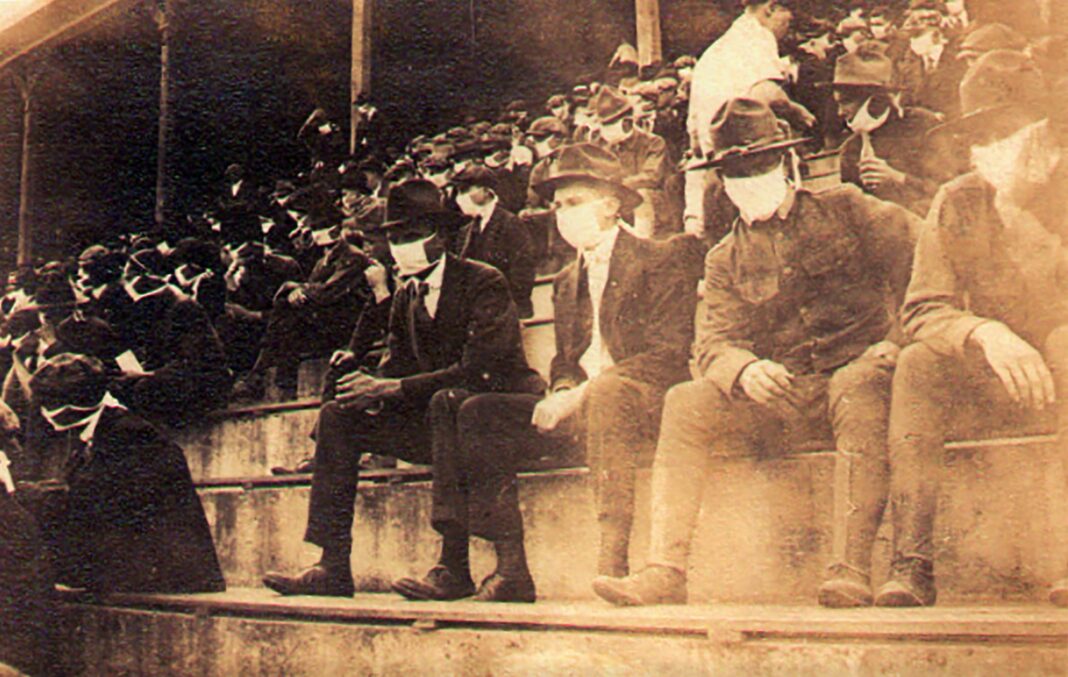Last week was another eventful week in the unfolding story of the 2020 COVID-19 pandemic in our country. As millions of Americans have suffered through the changes and ramifications of this virus, the sports world has been affected just like every other aspect of our society.
According to the Centers for Disease Control (CDC), “The 1918 influenza pandemic was the most severe pandemic in recent history. It was caused by an H1N1 virus with genes of an avian origin. In the United States, it was first identified in military personnel in the spring of 1918. It is estimated that about 500 million people or one-third of the world’s population became infected with this virus. The number of deaths was estimated to be at least 50 million worldwide with about 675,000 occurring in the United States.”
Political leaders in 1918 seemingly faced the same challenges to contain the virus as they have in 2020. Closing businesses, schools, churches, and other events of large gatherings were decisions that leaders of 1918 similarly faced as they have this year. And the decision to open schools this year is not unlike the decisions that were made in 1918.

According to an article published online by 40/29 News, “The Arkansas Board of Health put the state under quarantine in October 1918 and officials shut down all public schools. Children under the age of 18 were confined to their homes into December. The epidemic continued to kill Arkansans through 1919, eventually taking at least 7,000 lives.” The CALLS Encyclopedia of Arkansas stated, “The epidemic disappeared almost as suddenly as it struck. Milder forms of influenza have followed, such as “swine flu” and the Asian and Hong Kong flu varieties, challenging medical science to treat each new form.”
And just as in the case of today’s COVID-19 pandemic, the question of opening schools during the 1918 pandemic was also controversial. According to PBS.org, the decision to open schools in large cities in 1918 was based, in part, by the belief that some students were living in less favorable conditions than those that could be provided by public schools. “Sanitary” conditions, that were purported to exist, for example, in the New York Pubic School System, were deemed to be more favorable for students than those who, for example, were living “in places like the Lower East Side” of New York City. In Chicago, the commissioner of the Department of Health cited a “fluphobia” of parents who were reluctant to send their children back to school. Bottom line, the leaders of 1918 felt that schools were a more favorable place for the overall welfare of students than the environments they were living in at the time. The attention in 1918 was focused on physical health and sanitation, and in 2020, the focus is on mental health and potentially abusive or neglecting conditions that may affect children during school closures.
On the sports scene, President Woodrow Wilson, concerned about the morale of the country, stated, “It would be difficult to overestimate the value of football experience as part of the soldier’s training (in response to establishing football teams at military bases to play college football teams during the pandemic [Source: SI.com]. “Many schools were not able to play until late October or early November. The annual Army-Navy game was not played. Many schools played only three or four games. While there were some who felt college football should completely shut down because of the pandemic, President Woodrow Wilson felt that football added to the overall morale of the country.”
College football survived, as did professional baseball. Players continued to play, and they played wearing face masks. Fans wore face masks as well in 1918, and we will be expected to do the same in 2020.

So the on-going debate in our state and nation will be over the same issues and questions that our nation faced in 1918. It is not my place to express my view points or political beliefs. But I do want to offer my opinion on the much needed support for our schools and teachers that will be needed for the upcoming school year.
As our teachers prepare to go back to work in their classrooms, our students prepare to go back to school, and our student-athletes in both high school and college prepare to play a season unlike any that has been faced in over 100 years, I will say that this is a time for us to reflect on lessons learned from the past, as well as developing a strong sense of solidarity and support for each other. As the Spanish-American philosopher, George Santayana once said, “Those who cannot remember the past are condemned to repeat it.”
Acknowledging our past may be a difficult thing for us today, but as Santayana suggested, we must learn from the pandemic of 1918 and apply those lessons to the pandemic of 2020. Those lessons may not solve any questions today just as they could not be solved 100 years ago, but we can at least have the comfort of knowing that as a nation, we have been down this road before…and we survived to become a stronger nation.
And of much less importance, sports will survive. We pray that our students, teachers, athletes, and all concern will be safe, and that hope is not too far off in the future for relief from this terrible virus.

As a retired school administrator, I will offer to all of our readers that our teachers and our schools need your patience and support now more than ever. It will not be easy for anyone. And it will not be made easier by blaming or directing anger at our schools. As with any other year, our schools and their staffs are following directives from state and federal authorities, and when it all boils down, it comes down to the classroom teacher trying to make the best of a bad situation for all of their students.
Nurses and other health professionals have rightly been referred to as heroes throughout the pandemic. And as the new school year approaches, I suggest that we add to the list of heroes our teachers, administrators, volunteers, and everyone connected to our schools who will be dedicating themselves to not only your children’s education, but safeguarding their health, as well. God bless them all.








